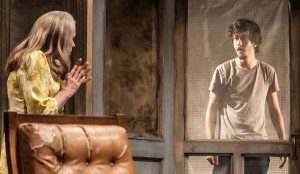It’s been 20 years since the Broadway revival of Buried Child, and the production by The New Group at the Pershing Square Signature Center suggests that Sam Shepard’s 1978 Pulitzer Prize-winning play has lost some luster. Echoing classic American dramas of dysfunctional families—notably Who’s Afraid of Virginia Woolf? and Long Day’s Journey Into Night—Shepard’s portrait of the American dream gone awry is a post-Vietnam nightmare that combines melodrama and absurdist elements. The latter can try one’s patience, as Shepard hacks away at American mythology with a scythe.
In Derek McLane’s shabby, brownishly-decorated Illinois farmhouse live three people: Dodge (Ed Harris), a sickly, cantankerous, whiskey-swilling patriarch who lounges on a beat-up sofa with a ratty blanket that is every bit as necessary to him as Linus’s in Peanuts. This feeble figure, whose name evokes Dodge City and Western heroism gone to seed, is married to Amy Madigan’s beady-eyed Halie, a woman who is cuckolding him with the local priest, Father Dewis (Larry Pine), who buys her telltale yellow roses. From him, she also wants public support for a statue of their late son Ansel, a basketball “star,” she claims, who died under mysterious circumstances.
A new inhabitant is another son, Tilden, played by Paul Sparks as mentally challenged in the vein of Lennie Small in Of Mice and Men. Tilden has returned home after 27 years in New Mexico; he is generally soft-spoken as well as soft-headed. He finds corn in the backyard when his parents swear nothing grows there, brings it inside and shucks it. Occasionally, he mutters in a shell-shocked way about a secret and something buried in the yard.
Dodge and Halie have a third son, Bradley (Rich Sommer), who uses a wooden leg after a chain-saw accident. Dodge is terrified that Bradley will sneak in and cut his hair while he’s asleep, and indeed, an emasculation in the manner of Samson occurs at the end of Act I. (Shepard’s 1978 version was three acts; in 1996 he reworked the script, and the current production plays without intermission.)
The couple who upset the apple cart, as it were, are Vince, Tilden’s son and the grandson of Dodge and Halie, and his girlfriend, Shelly (Taissa Farmiga); they drop in on his grandparents while traveling cross-country to see Tilden in New Mexico. (Parent-child communications in this family take a beating: Nat Wolff’s Vince hasn't seen his grandparents in six years; and, of course, he has no idea his father has left New Mexico. Moreover, neither father nor grandfather recognizes Vince, let alone remembers him.)
Both McLane’s set and Susan Hilferty’s costumes do a fine job of conveying realism, but much is left unexplained, and one’s suspension of disbelief often strains under Shepard’s symbolism. Why does Vince leave the house to buy liquor and not return till the next morning? Apparently so Shelly can be victimized by the sadistic Bradley and scorned by Dodge and Halie. And when they turn hostile, why doesn’t she explain more quickly that she is their grandson’s girlfriend? Or warn off Bradley before he takes advantage of her? The stage time that it takes for her to use common sense is, as Mark Twain would say, “a stretcher.”
In a climactic moment, when Halie discovers that the backyard has a bounty of vegetables, she yells to Dodge: “Tilden was right about the corn, you know. I’ve never seen such corn… dazzling. Tall as a man already… Carrots, too. Potatoes. Peas.” The idea that a field of high corn would not have been noticed in the backyard defies realism, as does Halie’s mention of potatoes. If she has not seen the corn until now, how can she possibly claim there are potatoes under the earth? But the symbolism of a harvest sprouting from blood and death is the point, not rationality or realism.
Still, in Tilden’s corn-shucking and later, Shelly’s cutting up carrots, director Scott Elliott brings out the humor, although the two younger cast members pale in gravitas and skill compared with the superb veterans. Elliott also creates a terrific sense of febrile menace and poisoned trust. “You think because people propagate they have to love their offspring?” Dodge asks Shelly. “You never seen a bitch eat her puppies?” Life in this American home resembles a dogfight.
Shepard’s cynical view of American ideals and debased notions of national self-esteem were certainly fashionable in the late 1970s. To a large extent they are still hanging around. But Buried Child, for all the vigor of its performances, feels just a bit stale.
The New Group production of Buried Child will play through April 3 at the Alice Griffin Jewel Box Theatre at the Pershing Square Signature Center (480 West 42nd St., between 9th and 10th Avenues) in Manhattan. Evening performances are Tuesday-Friday at 7:30 p.m., and Saturdays at 8 p.m. Matinees are Saturday and Sunday at 2 p.m., and on Wednesdays at 2 p.m. Tickets are $25-$115 and may be arranged visiting www.thenewgroup.org, or through Ticket Central at 212-279-4200, or in person at 416 West 42nd St. (noon to 8 p.m. daily).








